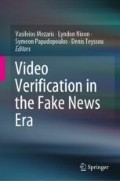Abstract
This final chapter borrows the concept of force of falsity from the famous Italian semiotician and novelist Umberto Eco to describe how manipulated information remains visible and accessible despite efforts to debunk it. In particular, search engine indexes are getting confused by disinformation and they too often fail to retrieve the authentic piece of content, the one which is neither manipulated nor decontextualized.
Access this chapter
Tax calculation will be finalised at checkout
Purchases are for personal use only
Notes
- 1.
Eco, U. Serendipities, Language and Lunacy. New York, Columbia University Press. 1998.
- 2.
- 3.
“Using disinformation to amplify suspicions and divisions” in Aaltola, M. Democracys Eleventh Hour: Safeguarding Democratic Elections Against Cyber-Enabled Autocratic Meddling, FIIA Briefing Paper 226, November 2017. Available at https://www.fiia.fi/sv/publikation/democracys-eleventh-hour?read (retrieved on 10/30/2018).
- 4.
Huyghes, F-B, “Que changent les fake news?” La Revue internationale et stratégique, 110, 2018/2, pp. 83-84. Translated into English in Jeangène Vilmer, J. B. Escorcia, A. Guillaume, M. Herrera, J. Information Manipulation: A Challenge for Our Democracies, report by the Policy Planning Staff (CAPS) of the Ministry for Europe and Foreign Affairs and the Institute for Strategic Research (IRSEM) of the Ministry for the Armed Forces, Paris, August 2018. Available at https://www.diplomatie.gouv.fr/IMG/pdf/information_manipulation_rvb_cle838736.pdf (last retrieved on 11/3/2018).
- 5.
https://factcheck.afp.com/clip-guy-verhofstadt-saying-europe-needs-migration-has-been-taken-out-context-hungarian-government (last retrieved on 10/30/2018).
- 6.
https://factcheck.afp.com/no-it-not-video-saudi-assaulting-london-hospital-receptionist (last retrieved on 10/30/2018).
Author information
Authors and Affiliations
Corresponding author
Editor information
Editors and Affiliations
Rights and permissions
Copyright information
© 2019 Springer Nature Switzerland AG
About this chapter
Cite this chapter
Teyssou, D. (2019). Disinformation: The Force of Falsity. In: Mezaris, V., Nixon, L., Papadopoulos, S., Teyssou, D. (eds) Video Verification in the Fake News Era. Springer, Cham. https://doi.org/10.1007/978-3-030-26752-0_12
Download citation
DOI: https://doi.org/10.1007/978-3-030-26752-0_12
Published:
Publisher Name: Springer, Cham
Print ISBN: 978-3-030-26751-3
Online ISBN: 978-3-030-26752-0
eBook Packages: Computer ScienceComputer Science (R0)

